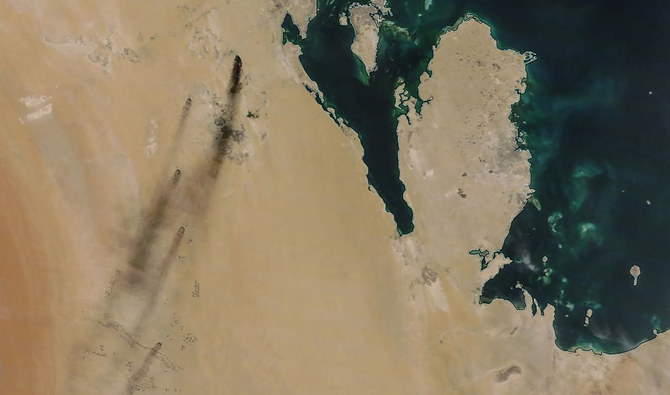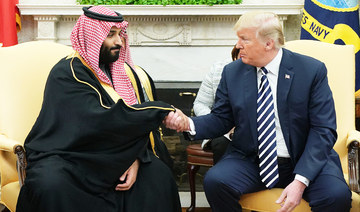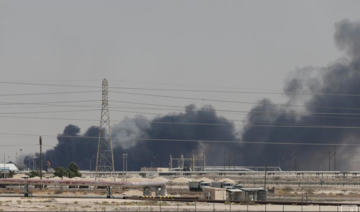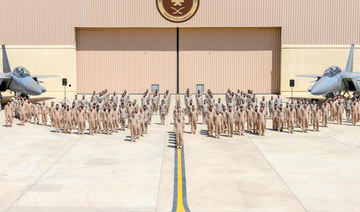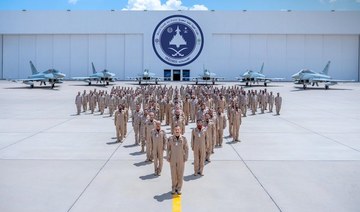ABU DHABI: When drones targeted the facilities of Saudi Aramco on Saturday, they signaled not only a new phase of a terror campaign against Saudi Arabia but also the determination of malign regional actors to disrupt global oil supplies, cripple energy-reliant economies and stir Middle East tensions.
The two-pronged attack on oil-production facilities in Abqaiq and Khurais in the Eastern Province was the biggest on oil infrastructure since Saddam Hussein’s invasion of Kuwait in 1990.
Responsibility for scores of attacks on civilian targets in Saudi Arabia involving rockets, drones and ballistic missiles has been claimed by Iran-backed Houthi militias since 2015. Saudi forces are part of a military coalition fighting the Houthis in Yemen.
The targets have included the holy city of Makkah, airports, royal residences, oil pipelines, desalination plants and oilfields.
A number of tankers in busy oil lanes have also been subjected to mysterious sabotage attacks involving mines, while commercial vessels have been harassed or seized by Iranian security forces.
Opinion
This section contains relevant reference points, placed in (Opinion field)
Experts say world leaders need to close ranks to put an end to the undeclared war of aggression and bring the faceless perpetrators to heel.
Yossi Mekelberg, a professor of international relations at Regent’s University London, says the attacks on vital installations represent a “really dangerous development” that Saudi Arabia and the wider world cannot afford to “sit back and let happen.”
“This is provocation, plain and simple,” he told Arab News. “This is a very serious escalation as it was an attack designed to cause major harm. Whoever did this knew it was provocation — and that a reaction is also guaranteed.
“Saudi Arabia will not be able to sit back and just let attacks like this happen. Attacks of this kind threaten a country’s economy, its sovereignty, its integrity — however you look at it.”
The Houthis said they carried out Saturday’s attacks with the help of 10 drones. But Mike Pompeo, US secretary of state, suggested the projectiles may have been launched from another country. Along with Yemen, Iran has proxy forces in Iraq, Syria and Lebanon — a policy that has long been blamed for causing instability in the region.
“Amid all the calls for de-escalation, Iran has now launched an unprecedented attack on the world’s energy supply,” Pompeo said on Twitter. “There is no evidence the attacks came from Yemen.”
The Arab coalition fighting to restore Yemen’s internationally recognized government said it was investigating who was behind the attacks.
According to Jim Hanson, president of the Security Studies Group, “the attacks were likely to have been launched from Iraq and done by Hashd Al-Shaabi militias in cooperation with their Islamic Revolutionary Guard Corps (IRGC) handlers.”
He said: “The distance from Houthi territory in Yemen is likely too far for the strikes to have come from there. The US should coordinate with Saudi Arabia to ensure the most effective response. Talk alone is not enough; this calls for action.”
However, Iraq’s prime minister has denied reports that Iraqi territory “was used for drone attacks on Saudi oil facilities.”
In a statement issued on Sunday, Adel Abdul-Mahdi said: “Iraq is constitutionally committed to preventing any use of its soil to attack its neighbors. “The Iraqi government will be extremely firm with whoever tries to violate the constitution.”

Prince Abdulaziz bin Salman, Saudi Arabia’s energy minister, said Saturday's incidents caused an interruption of an estimated 5.7 million barrels per day (bpd) of crude oil - or about half of the Kingdom's oil capacity, equivalent to five percent of the daily global oil supply. He confirmed there were no injuries to staff at the locations targeted.
According to Saudi Aramco, the Abqaiq facility is the largest crude oil stabilization plant in the world which processes more than seven million bpd of crude. The plant plays a vital role in removing sulphur impurities and reducing vapor pressure of the crude in order to make it safe for being transported by tankers.
The damage also led to the knockout of the production of two billion cubic feet of associated gas daily, used to produce 700,000 barrels of natural gas liquids.
A Refinitiv media advisory said "with the global demand forecasts being revised downwards on the back of trade wars and economic downturn, the impact on prices is expected to be limited unless further clarity on the extent of damage indicates a significant impact on Saudi Arabia’s production and exports."
Commenting on the chances of a recurrence of such attacks, Mekelberg said: “If they do happen again, then the implication for the Gulf is huge. It could lead to great escalation and even war in the Gulf although I do not think this is something anyone wants.
“They will lead to not only Saudi Arabia but other countries, such as the US, to react.”
Moving forward, Mekelberg said, “We need to go back and look at all the issues in the region — and try and solve them diplomatically. We have to try and prevent further violence — before things get out of hand.”




